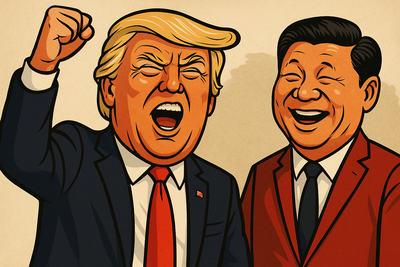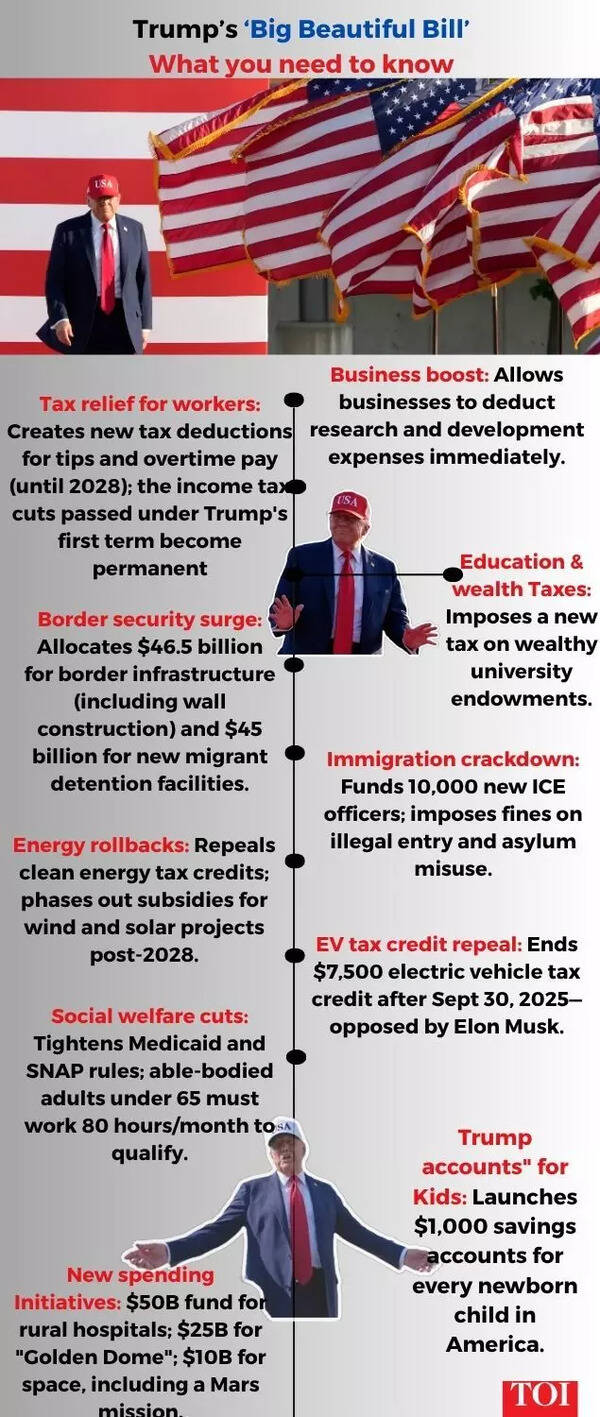Trump’s ‘big, beautiful bill’: Why it’s making China laugh – and stronger

On July 4, while Americans celebrated their independence, China may be celebrating something else: the greatest gift Washington has handed it in decades.President Donald Trump’s newly passed “One Big Beautiful Bill”-a sprawling 869-page tax and spending law-does more than enshrine his second-term agenda. It delivers a devastating blow to America’s renewable energy industry at the exact moment artificial intelligence is fueling a global electricity arms race. And it gives President Xi Jinping and China a clear runway to dominate that future.“There has never been a more intimate connection between a nation’s ability to generate huge amounts of electricity at affordable prices… and its economic and military might,” the New York Times columnist Thomas Friedman wrote this week. “The Chinese can’t believe their luck.”

Why it mattersExperts say this may be one of the most self-destructive energy policies in modern history. “It gives handouts to industries of the past while severely damaging industries of the future,” Tesla CEO Elon Musk said. China, meanwhile, is doubling down on solar, wind, and battery power, preparing to lead the next economic era.Friedman warned in the New York Times: “This dog’s breakfast of a bill… is sure to put at risk billions of dollars of investments in renewable energy… and potentially kill the jobs of tens of thousands of US workers.”The big picture
- Trump’s bill quickly phases out tax credits for utility-scale wind and solar projects and cuts incentives for electric vehicle buyers years ahead of schedule.
- The bill adds intricate restrictions on battery tax credits that exclude companies tied to “prohibited foreign entities” like China-ironically making the credits near-impossible to claim.
- The bill also kills the methane fee from the Inflation Reduction Act and delays permitting for key grid upgrades, all while locking in $4.5 trillion in tax cuts, $1.2 trillion in safety net reductions, and $350 billion in hardline immigration and military spending.
- Friedman summed it up sharply: “In one fell swoop, this bill will make your home hotter, your air conditioning bill higher, your clean energy job scarcer, America’s auto industry weaker and China happier.”
Zoom in: Texas shows the stakesTexas has quietly become America’s top clean power state. A Texas A&M report showed the state added 2,596 MW of solar, wind, and battery storage in just one quarter, overtaking California for the top spot.Texas grid expert Doug Lewin posted last week that the state added 10,000 megawatts of new power last year, mostly solar-plus-battery. “Brownouts are down,” he said, “and reliability is up.”But under Trump’s bill, future projects will be more expensive, slower to build, and potentially ineligible for tax credits. That means higher costs for utilities-and for families. “Now the electricity will cost consumers a lot more,” Lewin warned.What they’re saying:
- Elon Musk: “Utterly insane and destructive.”
- Nick Nigro, WSJ: “The big-picture outlook for energy is we are going to be less competitive because of this law.”
Ray Dalio : “This will lead to unimaginable tax increases or a lot of printing and devaluing of money.”- Thomas Friedman: “China may have to make July 4 its own national holiday going forward: American Electricity Dependence Day.”
Between the linesThe bill’s energy policies not only conflict with America’s innovation trajectory-they also defy global trends. Saudi Arabia is building solar farms to power AI data centers. Even fossil-fuel giants are investing in green energy for strategic advantage.China is using a different playbook. In 2000, it produced 1,300 terawatt-hours of electricity. Now it generates over 10,000, while the US has only added 500 terawatt-hours in the same time. China’s growth is increasingly coming from wind, solar, hydro, and battery projects-not coal.A Financial Times report from Shanghai described China’s strategic evolution into an “electrostate”-a nation powered by clean electricity and buffered against trade wars and geopolitical shocks, Friedman said in his NYT column.Debt dangers
- Beyond energy, the bill also obliterates fiscal sanity. Ray Dalio, founder of Bridgewater Associates, warns that the legislation pushes America deeper into a debt spiral that could crash credit markets and destabilize the global economy.
- The bill’s $4.5 trillion in tax cuts and defense spending will add another $3.4 trillion to the deficit by 2034, per the Congressional Budget Office. Government debt is now projected to hit 130% of GDP within a decade. That’s worse than the US level after World War II.
- Dalio didn’t mince words: “Unless this path is soon rectified… big, painful disruptions will likely occur.” His concern? That interest payments will balloon to $2 trillion annually, forcing a mix of inflation, tax hikes, and spending cuts that gut the economy.
- The bill also adds $3.3 trillion to the deficit, with Ray Dalio warning it will erode investor confidence and increase financial instability. “This path is unsustainable,” Dalio said.
What’s nextTariff trouble: Trump’s steel and aluminum tariffs could drive up the cost and delay deployment of gas turbines and renewables even further.AI grid crunch: With AI data centers consuming vast amounts of electricity, grid expansion is urgent. But Trump’s bill delays and obstructs transmission upgrades-slowing economic growth.Job losses: Research firm Energy Innovation projects the bill will increase wholesale electricity prices by 50% by 2035, raise household energy costs by $16 billion annually by 2030, and eliminate or prevent 830,000 renewable jobs.Trump calls it “beautiful.” But to Beijing, it’s miraculous. Friedman put it bluntly: “There are only two political parties in the world today cheering the passage of this bill: Trump’s Republican Party and the Chinese Communist Party.”(With inputs from agencies)




